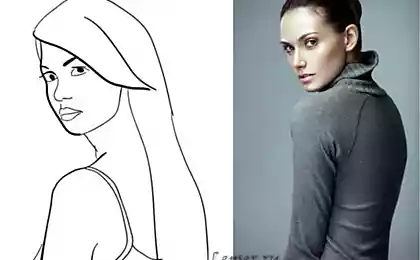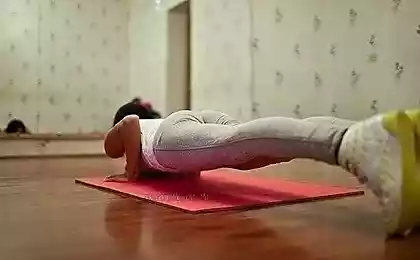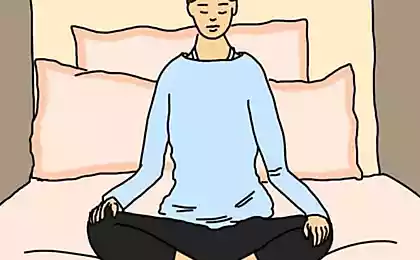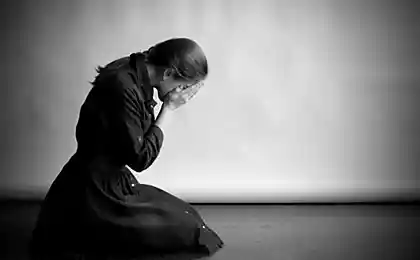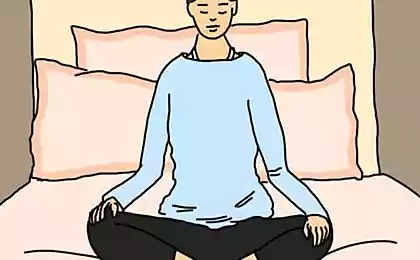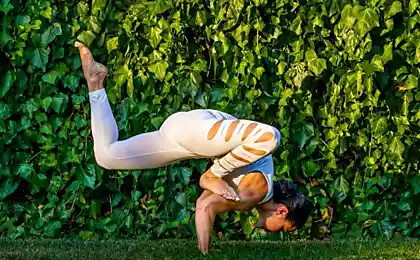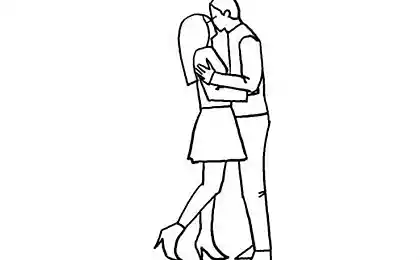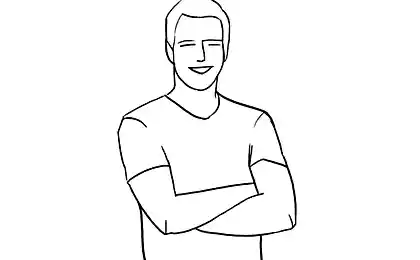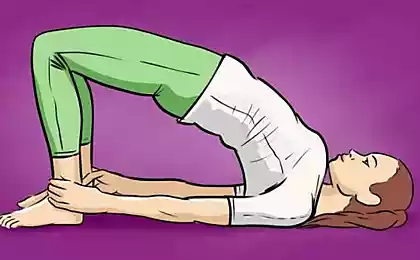439
Reprogram yourself for 2 minutes: how posture affects mood
Why to feel above so feel more confident as the dependence on the smartphone to be a cause of depression and other important scientific facts from Fast Company magazine. When you feel sad and depressed, pay close attention to your posture. According to representatives of cognitive science, it is highly likely that at that time you will be in a flexed position, the neck and shoulders are tilted forward, the head will be facing down.
You sit because you are sad. But the opposite is true: you are sad because you sit in this position. The relationship between our mind and body work both ways, that is, the mind affects the body's response, but the position of the body gives signals to the brain.
Largely due to the popular lectures at TED, Amy Cuddy, we know that two minutes of "powerful poses" a day can change our attitude. It's not only about how to show confidence to others; there are literally hormonal changes, increased levels of testosterone and decreases the level of cortisol, a stress hormone.

"In the brain is the area that is associated with confidence, but when this plot is enabled, it is not so important that it was included," says Richard petty, Professor of psychology at the University of Ohio. "It is difficult to distinguish real confidence from confidence, which comes only due to the fact that you sit up straight... it's about the same as with a smile: happiness and joy makes you smile, but the smile increases levels of happiness." As for the poses, petty says that our ultimate well-being is largely related to how high we feel. For example, if you put one person on a chair, in which he above the other, the one who is taller, feel more power and influence. This Association is triggered automatically when the body moves in a certain way. Your posture tells your brain that you powerful, and this, in turn, affects your attitude.
In the 2009 study, published in the European Journal of Social Psychology, petty and other researchers instructed students to "sit up straight" and "puff out the chest", or "stay bent over", "looking at the knees." Then they were asked to list three positive or negative personal qualities, which, in their opinion, will impact their future satisfaction with your work and professional results. Then they were asked to answer a questionnaire in which they assessed how well in the future they will manifest themselves as experts.
The researchers found that self-esteem of students depended on the posture, by adopting which they listed positive or negative traits. Those who sat straight, believed in, and recorded their positive or negative traits, and those who sat hunched over, were not convinced of these negative or positive traits. In other words, while the students took the line, confident position, they trusted their own thoughts, whether those thoughts are positive or negative. And sitting in a limp position, they believed what they wrote, both positive and negative.
The people occupying the direct position, it is easier to think about their strengths, positive traits that you want to write, and those who were sitting in a bent position, it is probably easier to remember the feelings of "hopelessness, helplessness, powerlessness and negativity," says Erik Peper, Professor of psychology at the University of San Francisco.
Peper has conducted a series of experiments and found that when you are sitting in a dejected, helpless position, it encourages more negative thoughts and memories, and straight powerful posture facilitates the arrival of inspirational thoughts and memories.
"Emotions and thoughts affect our posture and our energy level, conversely, posture and energy affect our emotions and thoughts," reads one study Paper. Two minutes of jumping and jumps compared to walk in stooped posture can have a significant impact on energy level. Research Paper, like Cuddy, show that the "charge" of hormones it requires only two minutes, so you can change chemical reactions in the brain, while waiting for heating up food in the microwave.
Since the pose strongly affect mood and thoughts, the fact that we often sit or walk, hunched before the computer or looking at a smartphone — can explain the increase in depression in recent years. Peper and his colleagues believe that the posture considerably affects the energy level and depression. Slouching can also lead to frequent headaches, pain in the neck and shoulders.
Studies of the effects of posture on our brain for many, and pepper offers to hang photos of your favorite people a little higher up on the wall or on the table so you had to look up. In addition, is a little higher than direct rearview mirror, so you sit higher while driving. If you need some reminders, Peper recommends to put them on the phone, on the computer or just hang a note on the fridge.
And when you have negative thoughts, instead of reinforce them, stooped posture and head tilt, it is better to write them on a piece of paper and then throw the paper in the trash.
"People who throw negative thoughts into the trash, less susceptible to their influence than people who come up with the same thoughts and that in a symbolic sense, put them in your pocket, says petty. — That is the idea that it's not what we think but how we trust your thoughts". published
P. S. And remember, only by changing their consumption — together we change the world! ©
Source: ideanomics.ru/?p=4606
You sit because you are sad. But the opposite is true: you are sad because you sit in this position. The relationship between our mind and body work both ways, that is, the mind affects the body's response, but the position of the body gives signals to the brain.
Largely due to the popular lectures at TED, Amy Cuddy, we know that two minutes of "powerful poses" a day can change our attitude. It's not only about how to show confidence to others; there are literally hormonal changes, increased levels of testosterone and decreases the level of cortisol, a stress hormone.

"In the brain is the area that is associated with confidence, but when this plot is enabled, it is not so important that it was included," says Richard petty, Professor of psychology at the University of Ohio. "It is difficult to distinguish real confidence from confidence, which comes only due to the fact that you sit up straight... it's about the same as with a smile: happiness and joy makes you smile, but the smile increases levels of happiness." As for the poses, petty says that our ultimate well-being is largely related to how high we feel. For example, if you put one person on a chair, in which he above the other, the one who is taller, feel more power and influence. This Association is triggered automatically when the body moves in a certain way. Your posture tells your brain that you powerful, and this, in turn, affects your attitude.
In the 2009 study, published in the European Journal of Social Psychology, petty and other researchers instructed students to "sit up straight" and "puff out the chest", or "stay bent over", "looking at the knees." Then they were asked to list three positive or negative personal qualities, which, in their opinion, will impact their future satisfaction with your work and professional results. Then they were asked to answer a questionnaire in which they assessed how well in the future they will manifest themselves as experts.
The researchers found that self-esteem of students depended on the posture, by adopting which they listed positive or negative traits. Those who sat straight, believed in, and recorded their positive or negative traits, and those who sat hunched over, were not convinced of these negative or positive traits. In other words, while the students took the line, confident position, they trusted their own thoughts, whether those thoughts are positive or negative. And sitting in a limp position, they believed what they wrote, both positive and negative.
The people occupying the direct position, it is easier to think about their strengths, positive traits that you want to write, and those who were sitting in a bent position, it is probably easier to remember the feelings of "hopelessness, helplessness, powerlessness and negativity," says Erik Peper, Professor of psychology at the University of San Francisco.
Peper has conducted a series of experiments and found that when you are sitting in a dejected, helpless position, it encourages more negative thoughts and memories, and straight powerful posture facilitates the arrival of inspirational thoughts and memories.
"Emotions and thoughts affect our posture and our energy level, conversely, posture and energy affect our emotions and thoughts," reads one study Paper. Two minutes of jumping and jumps compared to walk in stooped posture can have a significant impact on energy level. Research Paper, like Cuddy, show that the "charge" of hormones it requires only two minutes, so you can change chemical reactions in the brain, while waiting for heating up food in the microwave.
Since the pose strongly affect mood and thoughts, the fact that we often sit or walk, hunched before the computer or looking at a smartphone — can explain the increase in depression in recent years. Peper and his colleagues believe that the posture considerably affects the energy level and depression. Slouching can also lead to frequent headaches, pain in the neck and shoulders.
Studies of the effects of posture on our brain for many, and pepper offers to hang photos of your favorite people a little higher up on the wall or on the table so you had to look up. In addition, is a little higher than direct rearview mirror, so you sit higher while driving. If you need some reminders, Peper recommends to put them on the phone, on the computer or just hang a note on the fridge.
And when you have negative thoughts, instead of reinforce them, stooped posture and head tilt, it is better to write them on a piece of paper and then throw the paper in the trash.
"People who throw negative thoughts into the trash, less susceptible to their influence than people who come up with the same thoughts and that in a symbolic sense, put them in your pocket, says petty. — That is the idea that it's not what we think but how we trust your thoughts". published
P. S. And remember, only by changing their consumption — together we change the world! ©
Source: ideanomics.ru/?p=4606
